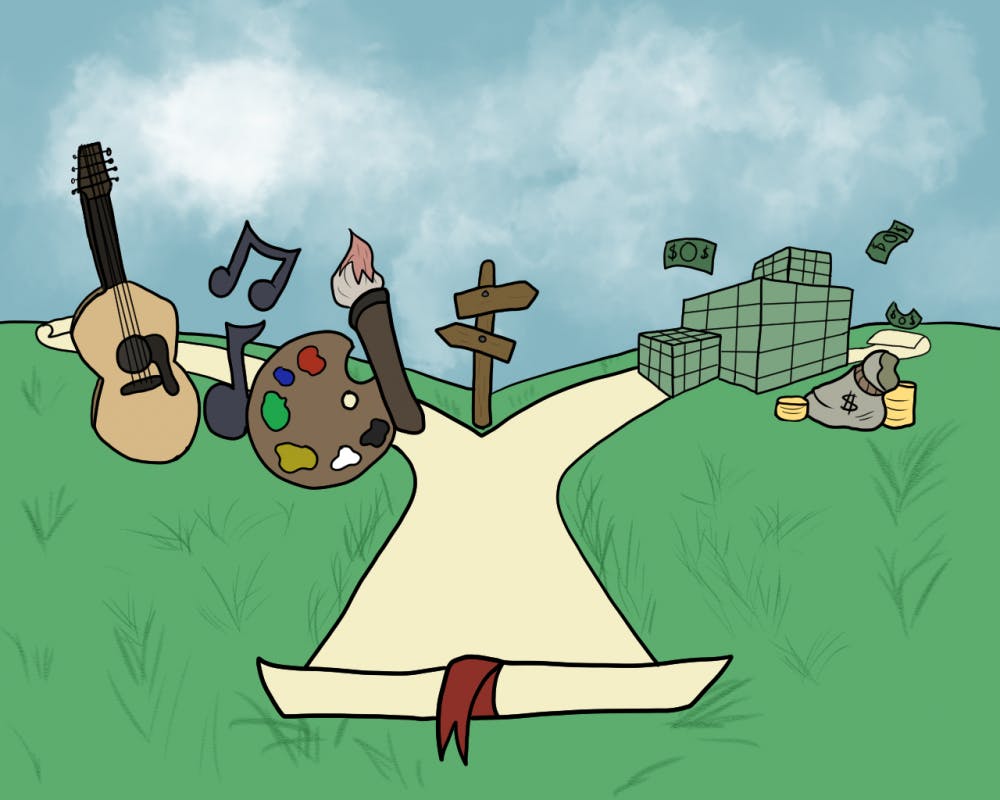Choosing a major is probably one of the toughest decisions made in one's college career. Many students are pressured to study subjects that are lucrative but lackluster. Those who are considering a creative arts major may especially struggle with this.
Many creative majors have been labeled worthless because of their presumably low incomes and the competitive job markets they entail.
However, choosing something you're passionate about may be equally as valuable as these money-making majors, as long as the student understands and accepts the prospects of their chosen major.
Money should not be the only determining factor when choosing what degree to pursue. While debt and income are important factors, students also need to consider quality of life, and genuine interest in the industry.
“If you don’t love what you’re learning, then any amount of money or time spent on it is time you could argue would be better spent doing something you love to do," Jeff Tellin, senior financial literacy coordinator for the Mary Lou Fulton Teachers College at ASU, said. "That should inform what you decide to study in college.”
Many students are pressured to choose something they don’t want, only to later find themselves bored, failing or major-hopping. Disinterest leads to complacency, costing students valuable time, money and grades. Picking a major according to passion and interest will likely motivate students to work harder.
The stereotype that creative majors probably won’t find stable, well-paying jobs isn’t going to be true for everyone. Success is largely determined by experience, and how people market themselves.
ASU should teach students how to utilize their creative degrees and make the most of them in the job market. By putting in the necessary hard work and being committed to going above and beyond, success in this field is certainly possible.
This is especially seen in music, an area of study that is often criticized for job instability. However, there are plenty of opportunities for graduates in the music industry.
“At least for performing musicians, the other disciplines (of music) have a better chance at getting a regular paying job. We also have degrees in … music education and music therapy. Those people are walking straight into jobs without hesitation,” Carole FitzPatrick, voice area coordinator and associate professor of voice at ASU's School of Music, said. “They are desperate for music therapists and music educators in this state.”
Artistic majors add value to our society as a whole. They preserve and connect cultures.
“The arts are important to the world," FitzPatrick said. "It’s important that we keep our culture, and that we continue our culture, and that we continue developing our culture – that we don’t become just about making money, that we remain interested in creating beauty in the world and are not just concerned with the almighty dollar.”
As a diverse and innovative University, ASU should invest in opportunities for creative majors. Students should have the opportunity to pursue their passions, whether that guarantees them a high paying job or not.
“ASU needs to give us more scholarship money. It’s as simple as that really,” FitzPatrick said. “We (previously) had more than we had now. We had a whole pile of scholarship money taken away from us years ago, right around the time of the market crash, and it was understandable. The school needed the money, (but) we need that money back to encourage people to continue in the arts.”
Universities, like ASU, should not disassociate themselves from passion. Going to college for four years is already tough, so by re-enforcing the idea that it’s okay to do what you love, no matter the income, students can be a part of a more welcome, less stressful workforce.
Reach the columnist at tkallye@asu.edu or follow on Twitter @trwscuit.
Like The State Press on Facebook and follow @statepress on Twitter.
Editor’s note: The opinions presented in this column are the author’s and do not imply any endorsement from The State Press or its editors.
Want to join the conversation? Send an email to opiniondesk.statepress@gmail.com. Keep letters under 500 words and be sure to include your university affiliation. Anonymity will not be granted.




